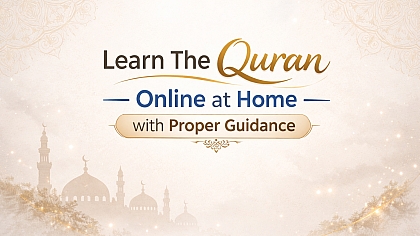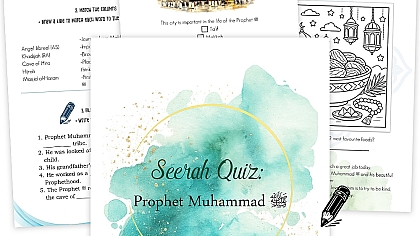
How to Become a Muslim: A Step-by-Step Guide for Beginners
What is Islam?
Islam is one of the world's major religions with over 1.8 billion followers. Islam is based on the teachings of the Qur'an and the Prophet Muhammad (Peace be upon him), who received revelations from God through the angel Gabriel, known in Arabic as Jibreel (Alaihis salaam).
If you are interested in becoming a Muslim, this step-by-step guide will provide you with the information you need to start your journey toward Islam.
Learn About the Basic Tenets of Islam
Before you revert to Islam, it is important to understand the basic tenets of Islam. The most important of these tenets is the belief in one God (Allah), the belief in the prophets including Prophet Muhammad (Peace be upon him), the belief in the Qur'an as the holy book, and the belief in the Day of Judgment.
Find a Community or Mosque Near You
One of the best ways to learn more about Islam and to get support on your journey toward becoming a Muslim is to find a community or mosque near you. You can search for local mosques online or through social media. You can also reach out to Muslim friends or acquaintances for guidance and support, and also to the team here at MuslimHut.com.

Take the Shahada
The Shahada is the declaration of faith in Islam. It is a simple statement that confirms your belief in Allah and the Prophet Muhammad (Peace be upon him). The Shahada is a necessary step towards reverting to Islam. It is recommended that you recite the Shahada in the presence of two Muslim witnesses.
Embrace the Five Pillars of Islam
The Five Pillars of Islam are the foundation of the Muslim faith. They include the declaration of faith (Shahada), prayer (Salah), charity (Zakat), fasting (Sawm), and pilgrimage to Makkah (Hajj). These pillars help Muslims to develop a closer relationship with Allah and to live a more ethical and fulfilling life.
Seek Knowledge and Guidance
Becoming a Muslim is a journey that requires continuous learning and growth. Seek knowledge and guidance from books, online resources, and your local mosque. Attend classes and seminars, and reach out to knowledgeable members of the Muslim community for advice and support.
The Qur'an encourages seeking knowledge and guidance from those who are knowledgeable in a particular area. In Surah Nahl (16:43), Allah says:
"Ask those who know, if you do not know."
This verse emphasizes the importance of seeking knowledge and guidance from those who are experts in their fields. It also emphasizes the value of humility and recognizing that there are people who may know more than we do.
In addition, the Qur'an emphasizes the importance of seeking knowledge throughout many other verses, such as Surah Al-Baqarah (2:269) which states:
"He grants wisdom to whom He pleases, and he to whom wisdom is granted indeed receives a benefit overflowing, but none will grasp the message but men of understanding."
These verses make it clear that seeking knowledge and guidance from those who are knowledgeable is a key aspect of Islam, and that it is an essential part of becoming a wise and knowledgeable person.
Embrace Your New Identity as a Muslim

Finally, embrace your new identity as a Muslim. Remember that reverting to Islam is a personal choice that you have made for yourself. Have a sense of dignity and be proud of your faith and the values it represents. Surround yourself with a supportive community of fellow Muslims, and continue to learn and grow in your faith.
Having a sense of dignity can also involve a sense of responsibility towards oneself and others. It means being accountable for one's actions and behaviour and striving to be the best version of oneself.
In Islam, being proud of one's faith is a positive thing, as it is considered a source of strength and a means of achieving success in this life and the hereafter. However, pride in one's faith should be tempered with humility and respect for others.
Islam teaches that Muslims should be proud of their faith because it is a complete and comprehensive way of life that provides guidance on all aspects of life, including individual behaviour, social interactions, and worship. The Qur'an states in Surah Al-Hujurat (49:13):
"O mankind, indeed We have created you from male and female and made you peoples and tribes that you may know one another. Indeed, the most noble of you in the sight of Allah is the most righteous of you. Indeed, Allah is Knowing and Acquainted."
This verse emphasizes that the diversity of humanity is a sign of Allah's greatness and that righteousness, not race or nationality, is what makes a person noble in the sight of Allah. Therefore, Muslims should take pride in their faith, but not look down on others who do not share their beliefs.
Additionally, Islam teaches that pride should not lead to arrogance or boastfulness. The Qur'an states in Surah Luqman (31:18-19):
"And do not turn your cheek [in contempt] toward people and do not walk through the earth exultantly. Indeed, Allah does not like everyone self-deluded and boastful. And be moderate in your pace and lower your voice; indeed, the most disagreeable of sounds is the voice of donkeys."
These verses remind Muslims that pride should not lead to arrogance or disrespect towards others and that humility and modesty are important values to uphold. Therefore, while it is important to be proud of one's faith, it is equally important to be humble and respectful towards others, regardless of their beliefs.
Why do Muslims say Revert instead of Convert?

In Islam, the term "revert" is used to describe someone who embraces Islam, rather than "convert." This is because Islam teaches that all human beings are born with a natural inclination to submit to the will of Allah (fitrah), and it is only through external factors such as upbringing, culture, or exposure to other beliefs that they may deviate from this natural inclination. Therefore, when someone embraces Islam, they are considered to be returning to their natural state of submission to Allah, rather than adopting a new religion.
The use of the term "revert" also emphasizes that Islam is not a new or foreign religion, but rather the same religion that was revealed to previous prophets and messengers, such as Abraham, Moses, and Jesus (peace be upon them all). Islam is seen as a continuation of the same message of monotheism and submission to Allah that was taught by these earlier prophets, and as such, embracing Islam is seen as a return to the original and pure message of these earlier revelations.
The term "convert," on the other hand, implies a change from one religion to another, which is not entirely accurate in the case of Islam. Therefore, many Muslims prefer to use the term "revert" as a more accurate and respectful way of describing someone who embraces Islam.
Congratulations on taking this important step toward becoming a Muslim!
If you are considering embracing Islam or have questions about the religion, please know that reaching out for advice and guidance is a sign of strength and courage. It takes great courage to explore new beliefs and ideas, and we commend you for taking this step.
Islam is a religion of peace, mercy, and compassion, and it welcomes people from all walks of life. Whether you are seeking to learn more about Islam, have questions about its teachings, or are ready to embrace the faith, there are many resources available to support you on this journey.
Remember that seeking knowledge and guidance is a fundamental aspect of Islam, and there is no shame in asking questions or seeking help. We are here to support you and offer guidance every step of the way, and we pray that Allah guides you on this journey toward truth and fulfilment.
May Allah bless you and guide you to the path that leads to peace, happiness, and success in this life and the hereafter - Aameen!









